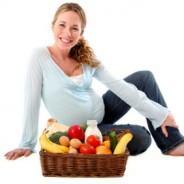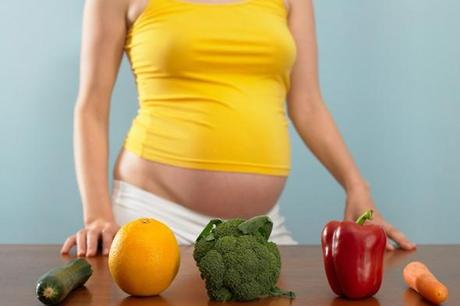
A pregnant woman needs to ensure that her diet provides enough nutrients and energy for her baby to develop and grow properly, and also to make sure that her body is healthy enough to deal with the changes that are occurring. The right diet can also help the mom-to-be prevent pregnancy problems like irregularity or hemorrhoids, and maintain her own store of nutrients, preventing issues like anemia or bone loss.
Just about all pregnant women need to get more protein, more of certain vitamins and minerals for example folic acid and iron, and much more calories. If your diet is poor to start with, making the transition to eating nutritious meals is among the best things you can do for your baby’s health.
What’s true is that during pregnancy a woman needs to provide good nutrition for two individuals. The growing baby gets its nourishment from its mother with the umbilical cord, so diet is very important. When the mother is lacking in any vitamins and nutrients her baby might lack them as well.
Foods To Eat During Pregnant
Eating well balanced meals is important at all times, but it’s even more essential when you are pregnant. There are essential nutrients, vitamins, and minerals that the developing baby needs. Most foods are secure; however, there are some foods that you should avoid during pregnancy.
Avocados
Packed with folic acid, potassium, vitamin C, and vitamin B6, avocados really are a delicious way to get your vitamins. Spread some ripe avocado in your whole grain roll as a healthy replacement for mayo. Keep in mind that avocados are full of fat and calories, so heap them in your plate only if you’re having problems gaining weight.
Fish
There are some kinds of fish you should limit, for example tuna and oily fish, plus some types of fish you should avoid completely, for example shark. Also, don’t eat raw shellfish, as it can certainly cause food poisoning.
Folate
During the first three months of pregnancy (and preferably before becoming pregnant) a woman needs folate. This is one of the B-group vitamins and is also referred to as vitamin B9. It is important during pregnancy for the creation of the baby’s central nervous system.
Broccoli
America’s favorite cruciferous vegetable, full of plenty of vitamins A and C, having a calcium bonus, as well as baby-friendly folate. Toss into pasta or casseroles, stir-fry with seafood or chicken, serve steamed, or dunk in dip.
Carrots
Carrots are tops with regards to vitamin A, so important for the development of kids bones, teeth, and eyes. They’re ideal for munching on the go, but they also shred neatly into just about anything (from salads to meatloaf to cakes to muffins). Carrots will also be a good source of vitamins B6 and C, and fiber to help keep things movin’.
Raw Eggs
Raw eggs or any foods which contain raw eggs should be avoided due to the potential exposure to salmonella. Some homemade Caesar dressings, mayonnaise, homemade frozen treats or custards, and Hollandaise sauces might be made with raw eggs.
Edamame
These green pods are in fact cooked soybeans – plus they taste so much better than they sound. Full of protein, calcium, folic acid, and vitamins A and B, edamame could be scooped up by the handful like a snack (salt them lightly, and you will never miss the chips), or tossed into almost anything you’re cooking, from soups, to pasta, to casseroles, to succotash, to stir-fry. Additionally they make a gas-free stand-in for beans. So remember the edamame, Mommy.
Lentils
Branch into beans for folate and protein, vitamin B6, and iron. Lentils would be the most intestine (and spouse) friendly legume and readily absorb a number of flavors from other foods and seasonings.
Mangoes
Sweet revenge for just about any vegetable avoider, mangoes contain more vitamins A and C bite for delicious bite than the usual salad. This tropical favorite, also full of potassium, is especially versatile, an ideal complement to sweet and savory dishes. Blend it into smoothies or soups, chop up in salsas or relishes, simply scoop and revel in.

Eat During Pregnant
Nuts
Nuts are chock-full of important minerals (copper, manganese, magnesium, selenium, zinc, potassium, as well as calcium) and vitamin E. Although they’re high in fat, it’s mainly the good-for-you kind – especially baby- brain-boosting DHA, that is found in walnuts. So the bottom line is, go nuts with nuts (moderately if you’re gaining quickly, liberally if you are gaining slowly) and toss them into salads, pasta, meat, or fish dishes, and baked goods.
Protein
Good animal-sourced proteins include fish, lean meat and chicken, in addition to eggs. Vegan mothers should think about the following foods as good sources of protein: Quinoa, tofu and soy products. Beans, lentils, legumes, nuts, seeds and nut butters will also be good sources of protein.
Oatmeal
Here’s valid reason to feel your oats (and eat them often). They’re filled with fiber, the B vitamins, and iron along with a host of other minerals. Fill your breakfast bowl together, but don’t stop there. You can add oats – and all sorts of their nutritional super powers – to pancakes, muffins, cakes, cookies, even meatloaf.
Spinach
Full of folic acid, iron (which you requirement for all those blood cells, Baby!), vitamin A, and calcium, spinach now comes ready to eat in prewashed bags (free from sand). Eat it raw, inside a salad (especially one with almonds and mandarin oranges), or like a wilted bed for fish or chicken, or layered in lasagna.
